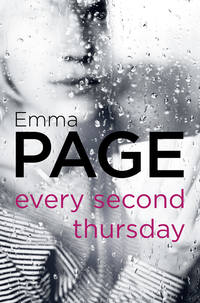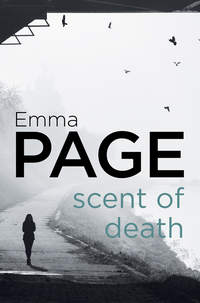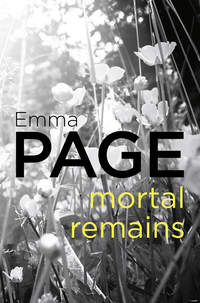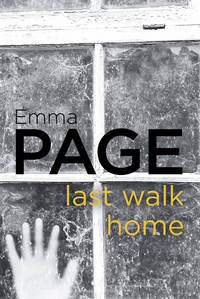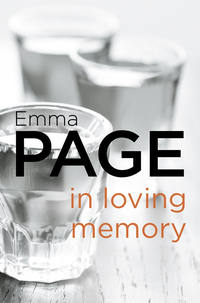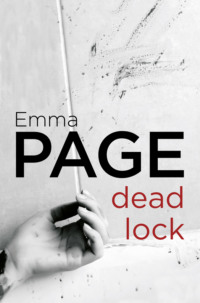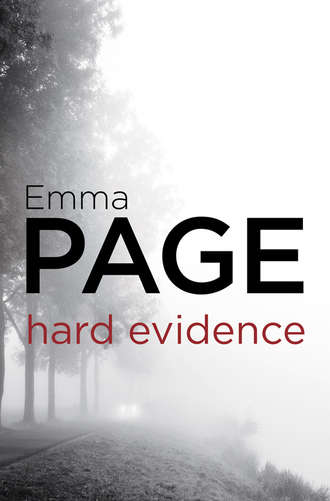
Полная версия
Hard Evidence
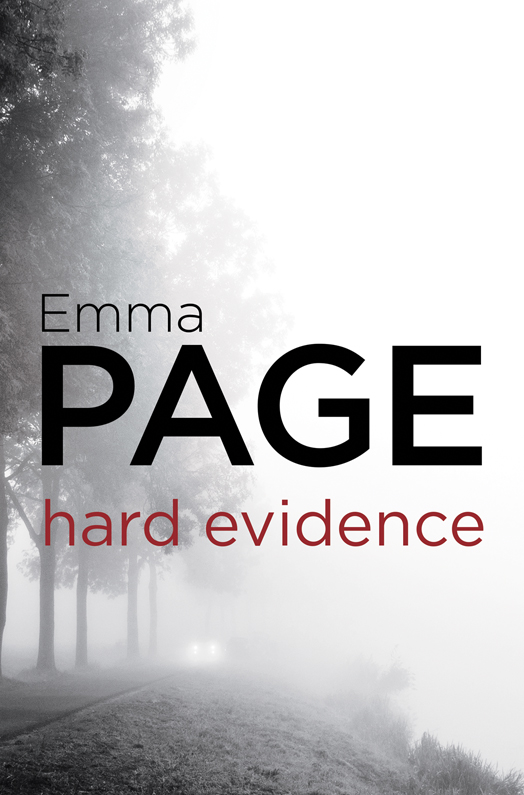

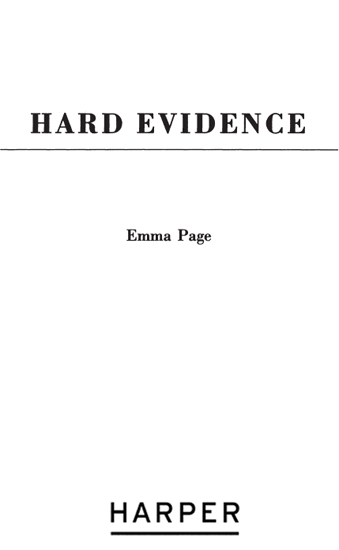
COPYRIGHT
This novel is entirely a work of fiction.
The names, characters and incidents portrayed in it are the work of the author’s imagination. Any resemblance to actual persons, living or dead, events or localities is entirely coincidental.
Harper An imprint of HarperCollinsPublishers 1 London Bridge Street London SE1 9GF
www.harpercollins.co.uk
First published in Great Britain in 1996 by Collins Crime
Copyright © Emma Page 1996
Emma Page asserts the moral right to be identified as the author of this work
A catalogue copy of this book is available from the British Library.
This novel is entirely a work of fiction. The names, characters and incidents portrayed in it are the work of the author’s imagination. Any resemblance to actual persons, living or dead, events or localities is entirely coincidental.
All rights reserved under International and Pan-American Copyright Conventions. By payment of the required fees, you have been granted the nonexclusive, nontransferable right to access and read the text of this e-book on-screen. No part of this text may be reproduced, transmitted, downloaded, decompiled, reverse-engineered, or stored in or introduced into any information storage and retrieval system, in any form or by any means, whether electronic or mechanical, now known or hereinafter invented, without the express written permission of HarperCollins e-books.
HarperCollinsPublishers has made every reasonable effort to ensure that any picture content and written content in this ebook has been included or removed in accordance with the contractual and technological constraints in operation at the time of publication.
Source ISBN: 9780008171841
Ebook Edition © MARCH 2016 ISBN: 9780008171858
Version [2016-02-18]
DEDICATION
For M. H.
in unceasing admiration
CONTENTS
Cover
Title Page
Copyright
Dedication
Chapter 1
Chapter 2
Chapter 3
Chapter 4
Chapter 5
Chapter 6
Chapter 7
Chapter 8
Chapter 9
Chapter 10
Chapter 11
Chapter 12
Chapter 13
Chapter 14
Chapter 15
Chapter 16
Chapter 17
Chapter 18
Chapter 19
Chapter 20
Chapter 21
Chapter 22
Chapter 23
Chapter 24
Chapter 25
Chapter 26
Chapter 27
Chapter 28
Chapter 29
Chapter 30
About the Author
By Emma Page
About the Publisher
CHAPTER 1
The thriving, bustling town of Millbourne looked its best on this sunny Tuesday afternoon in the third week of April. In his first-floor office overlooking the main street, Donald Fielding closed the file on which he had been working. He stood up from his desk and returned the file to its cabinet. He was a tall, lean man, thirty-seven years old, with thick, dark hair and sharp grey eyes. He was the proprietor of the Millbourne Advertiser, a highly successful freesheet, one of a number of such newspapers he owned in this part of the county.
He glanced at the phone, looked at his watch, expelled an impatient breath and crossed to the window. The top sash stood open to the soft air, laced with traffic fumes and the scents of spring.
After a few moments he turned from the window and went back to his desk; he began to work again. All his movements were quick and decisive. He glanced frequently at his watch. Whenever the phone rang he snatched up the receiver on the instant.
It was almost four when the call he had been waiting for, the call from George Gresham, head of Gresham Enterprises, at last came through.
Fielding sat leaning forward, rigid, listening, then his expression began to lighten, his shoulders relaxed. By the end of the call he was smiling broadly.
His tone was now briskly cheerful. ‘Right, then. Ten o’clock tomorrow morning. I’ll be there.’
He drew a deep breath of relief. He felt exuberant, charged with energy. He had the look of a man long resigned to old hindrances and restrictions, who sees all at once exciting challenges opening out before him.
Then his expression altered. Before those new opportunities could be grasped an existing association must be ended. He was foolish to have let it continue so long when it was plain weeks ago that the time had come to cut loose.
He rested an elbow on the desk, cupped his chin in his hand. He remained for some time frowning, pondering, calculating.
Wednesday dawned chilly and overcast but by lunch time the sun had broken through.
In the walled garden of Honeysuckle Cottage, in a secluded spot three miles from Millbourne, Audrey Tysoe spent the afternoon as she had spent many other afternoons since her retirement a few months ago at the age of fifty-five: working in her garden.
The cottage stood on its own at the end of a lane, some distance from the nearest village but within easy walking distance of a bus route into town. The garden was a fair size but she managed it herself.
Today she was busy clearing a tangled corner; the wheelbarrow beside her was now full. She wheeled it across the garden and emptied it onto the compost heap.
She was a dumpy woman, strongly built, with a slight, habitual limp. A shrewd, weathered face that no one had ever thought pretty; hair taken back without artifice into a scanty bun. Neat and tidy, even in her old gardening clothes; the air of a woman who has never bothered overmuch about her appearance and certainly doesn’t intend to start bothering about it at this stage of her life.
As she turned from the compost heap she heard the sound of a car in the lane. She glanced at her watch: just after 5.30. She gave a little nod. It would be Donald Fielding; he had phoned to say he intended coming. She had worked for Fielding until her retirement.
She heard the vehicle turn in through the gateway. By the time she had walked round to the front of the house Fielding was getting out of his car in the parking bay at the side of the drive.
He raised a hand and called out a greeting. He came up to her and put an arm round her shoulders, kissed her affectionately on the cheek. They sat down close together on a garden seat and were soon deep in earnest conversation. They had just about reached a satisfactory conclusion when there came the sound of another car approaching.
Julie Dawson came along the lane in her white Mini. As she turned into the driveway she saw Fielding’s car parked in the bay.
She drew a trembling breath, hesitated, then drove slowly round to the garage at the rear of the cottage, flicking a glance as she went by at the pair sitting side by side on the garden seat. They both looked across at her but neither waved, neither smiled. She felt a nervous tremor run through her.
She sat for a moment in the car, steadying herself, then she picked up her holdall and shoulder bag. Before she came into view again she squared her shoulders and assumed a confident smile. She was slightly built, twenty years old, with a pretty, heart-shaped face, sharp little features, a satiny skin. Hazel eyes, very bright, flecked with gold. A wealth of curling brown hair, full of russet lights.
She walked jauntily towards the other two, chattering cheerfully as she approached. ‘It wasn’t so terrible, after all. Just one filling, no injection. I could hardly feel it.’ She worked at the Advertiser and had been allowed to leave early to keep a dental appointment. ‘I went shopping afterwards, I felt I deserved a treat. I bought myself a jacket.’
She halted, reached into her holdall and drew the jacket from its wrappings. ‘It was marked down quite a bit. It seems a terrific bargain to me. I can’t see anything wrong with it.’
She held it up against her. An expensive-looking garment, fashionably cut; fine, smooth cloth in a muted grey-green check. ‘Do you like it?’ she asked. ‘Do you think it suits me? It goes with all my things.’
Neither of the other two responded to any of this with so much as a smile or a glance at the jacket. Fielding got to his feet and Julie’s stream of chatter fell away.
‘We need to talk,’ Fielding told her brusquely. ‘We’ll go inside.’ Without another word or look he went into the house.
Julie stood irresolute. She turned her head as if about to make a run for it, then she gave her shoulders a little shake and followed him with an air of compliant meekness.
But the look in her eyes as she stepped across the threshold was far from compliant.
Audrey sat gazing after them with an expressionless face, then she stood up and went limping over to a bed of daffodils. Here and there she nipped off a faded bloom, to be cast down later onto the compost heap.
CHAPTER 2
Rain began to fall early on Friday morning, dying away by eleven. It was almost noon as Detective Sergeant Lambert drove back to Cannonbridge. His inquiries had taken him to a couple of outlying villages where he had spent a fruitless morning chasing shadows. He felt tired and irritable, hungry and thirsty.
The sun shone down from a clearing sky. His route took him along minor roads little more than lanes, between flowering hedgerows, grassy banks starred with primroses, past orchards of pear trees snowy with blossom. His sour mood began to evaporate.
When he was still some half-dozen miles from Cannonbridge he rounded a bend and saw on the grass verge, a short distance ahead, a white Mini, standing sideways on to him, its back wheels sunk in the ditch. As he came up it became clear that the rear bumper had got itself hooked under a boulder, one of several strewn along the verge, which had fallen from the crumbling stone wall backing the ditch.
A girl crouched beside the vehicle, trying to free the bumper. She got to her feet as Lambert pulled up close by. He ran an appreciative eye over her. A pretty girl with strikingly beautiful brown hair glinting in the sunlight. She was trimly dressed in a dark green skirt, a smartly cut jacket in a muted grey-green check.
She was delighted at his offer of help. ‘I overshot the turning,’ she explained. ‘I was reversing and I skidded back into the ditch.’ She gestured over to the right. ‘I’m going to Calcott House.’ She saw the name meant nothing to him. ‘It’s a hotel,’ she added. ‘Quite near here.’
He got her to move aside the stone as he eased up the rear of the car. The end of the bumper was twisted and dented. ‘It’s no great damage,’ he assured her. ‘It won’t cost a fortune to put right.’ She thanked him profusely for his assistance.
‘This hotel you’re going to,’ he said. ‘Do they serve lunch to nonresidents?’ The notion of a decent meal in civilized surroundings appeared distinctly cheering. Particularly with the chance of a pretty girl to share his table.
‘I think they do,’ she told him. ‘I haven’t stayed there before. I used to live round here, in Calcott village, but I left three years ago. This is the first time I’ve been back – I’ve no family here any more. Calcott House used to be just a residential hotel but there were changes a few years ago; they did a lot to the place. I think maybe it changed hands at that time but I can’t quite remember. Anyway, they started doing bed and breakfast, catering for holiday-makers. I’m pretty certain they began doing meals for nonresidents at the same time.’ She gave him a friendly smile. ‘I’m sure they’ll give you lunch.’
He followed her Mini till they came in sight of tall wroughtiron gates standing open to a long drive flanked by flowering shrubs, running up to a large Victorian house framed by mature trees. A board by the gate assured him the hotel did indeed serve lunch and dinner to nonresidents.
In the car park the girl suggested it was time they exchanged names; hers was Julie Dawson. She wore an air of pleased expectancy as they walked across to the pillared entrance. ‘I always longed to come here when I was a child,’ she confided. ‘It seemed a mysterious, romantic place. But I never even set foot in the grounds. I used to make up stories about it. I used to tell myself: “One day, when I’m grown up, I’ll go and stay there.” I imagined that would be about as far as anyone could get in the high life.’
She gave him a grin, like an excited child. ‘Now here I am, walking in through the doors. I decided to come this weekend on the spur of the moment. I rang up and found they could take me. I was delighted.’
He waited for her in the lounge bar while she checked in. When she rejoined him he asked what she would like to drink.
She looked at his glass. ‘What’s that you’ve got?’
Nonalcoholic lager, he told her. She shot him a surprised, amused glance. ‘I still have to drive,’ he pointed out. ‘Unlike you.’ After a moment’s hesitation he added, ‘I’m a policeman. I’m on my way back to the station in Cannonbridge.’ He waited for the friendly expression to vanish from her face, for a look of cool wariness to succeed it.
But she leaned forward with an air of eager interest. She ran her eye over his dark suit, his white shirt. ‘Are you by any chance a detective?’ she asked. He admitted that he was. ‘I’m a detective sergeant, to be precise.’
She clapped her hands and gave him a gleeful smile. ‘How marvellous! I’ve never met a real-life detective before – I’ve never met any kind of policeman on a social level. I’ve always loved reading detective novels.’
‘I’m afraid it’s not always like it is in the books.’ He changed the subject without subtlety; he had no intention of spending the next hour talking about his job.
When she had finished her drink she suggested an inspection of the garden; there was plenty of time before lunch. They went out into the bright sunshine. The grounds were of considerable size and had clearly been laid out with much care at the time the house was built. They strolled past lawns, shrubberies, rockeries in full springtime splendour of pink and mauve, yellow and white. A dolphin fountain jetted cascades of diamond drops into the sparkling air; purple irises bloomed beside a pool. They followed a woodland walk through dappled green shade under an arching canopy of branches. The ground was carpeted with bluebells, forget-me-nots, violets, anemones. A relaxing air of peace and tranquillity brooded over the whole.
They wandered back towards the house and came upon a series of small individual gardens enclosed by formal hedges of clipped evergreens, each garden designed round a different theme. One had been entirely devoted to aromatic foliage plants in shades of silvery grey. Julie asked Lambert if he knew what the plants were. He had to admit he didn’t.
On a stone bench a few feet away a woman sat leaning back with her eyes closed. Beside her on the seat lay a folded newspaper and a spectacles case. At the sound of their voices she opened her eyes and sat up. She looked across at them and after a moment got to her feet and came over. A stocky woman, mid-fifties, with a vigorous appearance. Blunt features; short, iron-grey hair taken to one side and secured with a plain brown slide. No make-up; a scrubbed, clinically clean look. She wore a dark grey, chalk-striped suit tailored on lines of uncompromising severity.
With the briefest preamble of an apology for breaking in on them she began to identify the various plants for Julie, who listened with appreciative interest. A lonely woman, Lambert judged, snatching at any chance of conversation. As she gestured at the plants he saw that her stubby hands were bare of rings.
The stream of information flowed on unabated, and Julie began to exhibit signs of restlessness. She flicked a speaking glance at Lambert and started to walk away from the woman – still unflaggingly voluble – towards an archway cut through the hedge. Lambert fell in behind her. Undeterred, the woman went with them, continuing to hold forth about the garden and the grounds in general.
The three of them reached an open stretch of sward set at intervals with fine specimen trees in full flaunt of blossom. Some yards away a man, young and powerfully built, knelt with his back to them, working on a border. ‘That’s Luke Marchant,’ the woman said. ‘He does all the gardening here.’ She saw that Lambert didn’t recognize the name. ‘The hotel belongs to the Marchants,’ she explained. ‘Evan Marchant and his wife, they own and run it. Luke Marchant is Evan’s brother, he’s a lot younger than Evan. He’s done a wonderful job since he came here. It’s all he thinks about, the garden. He works all the hours God sends.’
Julie looked intrigued. She moved away from the other two, over to where Luke knelt, absorbed in his work. Lambert saw that she was attempting to engage him in conversation about what he was doing, her manner easy and affable.
‘She won’t get much change out of Luke,’ the woman beside Lambert observed in a sardonic tone. And from this distance it certainly appeared that Luke’s response was confined to a nod or shake of the head.
‘You really must take a look at the water garden,’ the woman advised Lambert. ‘“Water canal”, I gather, is the correct term for it.’ She indicated where it was. ‘It’s well worth seeing. Luke cleaned it out himself. He dredged it, repaired the stone and brickwork, a real labour of love. I’d come with you myself but it’s damp underfoot down there and I’m wearing a new pair of shoes.’ She gave a little laugh, glancing down at her shoes with pride, sticking out one foot for Lambert to admire. ‘I only bought them this morning. I couldn’t resist putting them on right away. I know they’re walking shoes but I’d rather not get them wet the first time I wear them.’
‘Very nice,’ Lambert remarked politely. Her feet were short and broad, the ankles thick and shapeless. The shoes, a laced pair made of stout leather in a shade of oxblood, looked as if they could withstand any amount of water and hard usage.
She wriggled her foot with satisfaction. ‘I never believe in skimping on shoes. If there’s one thing I learned early on in my working life, it’s to take good care of your feet, then they’ll never let you down.’
Julie came back and Lambert took her off to see the water garden. The woman returned to her seat on the stone bench.
Left to himself again, Luke Marchant sat back on his heels, his hands idle. He turned his head and gazed fixedly after the departing figure of the girl, her beautiful brown hair gleaming in the sunshine.
CHAPTER 3
Lambert’s watch showed five minutes to one as he and Julie made their way back towards the hotel. Lambert was by now ravenous.
A woman came along a nearby path, progressing gracefully in the same direction with the aid of an elegant walking stick. Not far off seventy, Lambert judged. She was chattering to a small pug-nosed dog, a black-and-tan King Charles spaniel, trotting docilely beside her at the end of a lead. From time to time the dog uttered a little bark by way of reply, tilting its head to look up at her.
The woman smiled in friendly fashion and spoke a word of greeting to Lambert and Julie. An aura of expensive French perfume drifted to Lambert’s nostrils as she went by. She was a lady of generous proportions, with the remains of great prettiness. Very well groomed, carefully made up; immaculately dressed hair of a subtle shade of ash blonde. She wore a light, flowery, floaty gown – the word ‘dress’ seemed too mundane for such an airy creation; it looked as if it had cost a great deal of money.
A long-term resident of the hotel, Lambert guessed; she had a relaxed air, as of someone very much at home in her surroundings. She came into the dining room – without her spaniel – a few minutes after Lambert and Julie had been shown to a table. She made a regal progress across the room, dropping a word here, a nod or smile there, till she reached her small table laid with a single place, not far from Julie and Lambert. Her name, Lambert gathered from exchanges during a stop she had made close by, was Mrs Passmore.
Julie made her choice after briefly scanning the menu but Lambert, in spite of his hunger, took somewhat longer to decide. He eventually settled on salmon but even then found himself torn between salmon mayonnaise and poached salmon with hollandaise sauce. The waitress, a cheerful woman with bleached hair and bright red lipstick – ‘Call me Iris, everybody does’ – guaranteed both dishes to be delicious. The chef was first class, she assured them, a young Frenchman who had been at the hotel a couple of years.
As Lambert finally opted for the mayonnaise the talkative grey-haired woman in the chalk-striped suit came into the dining room and took her seat alone at a table some distance away. She gave the two of them an acknowledging nod in passing.
‘I see you’ve met our Miss Hammond,’ Iris observed.
‘A very knowledgeable lady,’ Lambert remarked. ‘About plants, at any rate.’
Iris smiled. ‘That’s a recent craze with her. She’s bought herself a cottage out at the back of beyond; she’s moving there very soon. It’s nothing but gardening now all day long. Gardening books from the library, gardening programmes on the television and radio, gardening pages in newspapers and magazines. Six months ago I don’t suppose she could tell a daisy from a dandelion. But I’m pleased for her, she needed a new interest. She used to be a nurse – private, not hospital. She’s retired now.’
Iris suddenly became aware of the presence of a man and woman who had appeared in the doorway of the dining room and now stood murmuring to each other, their eyes everywhere, raking the tables, the guests, the food, the service, with practised speed. ‘The Marchants,’ Iris said in a low voice. ‘I’d better be off or I’ll be in trouble.’ She vanished towards the kitchen.
The pair in the doorway stood murmuring together a few moments longer. Evan Marchant was a dapper man in his mid-thirties, impeccably groomed, conventionally dressed. Sleek black hair, slicked back; dark eyes, alert and calculating. He looked poised and self-contained, very much in control; a man never likely to be taken by surprise.
Lambert put Mrs Marchant at a good ten years older than her husband. A little pouter pigeon of a woman with bright, darting eyes, hair elaborately dressed in a lofty style designed to add inches to her height; it was tinted an unflattering shade midway between dead leaves and Oxford marmalade.
Mrs Marchant left the dining room and her husband began a ritual tour of the tables. He leaned forward slightly as he progressed, gliding rather than walking, his hands lightly clasped before him. Lambert half expected to hear the strains of the ‘Skaters’ Waltz’ burst forth at any moment from an orchestra secreted behind the scenes.
Marchant paused at every table. His face wore an urbane, professional smile. When he reached Lambert’s table he inclined his head at Julie. He had already welcomed her to Calcott House when she checked in. ‘I hope everything is satisfactory?’ He had an unctuous voice. She assured him that it was. He inclined his head at Lambert. ‘We shall hope you’ll find yourself able to come and stay with us at some future date.’


